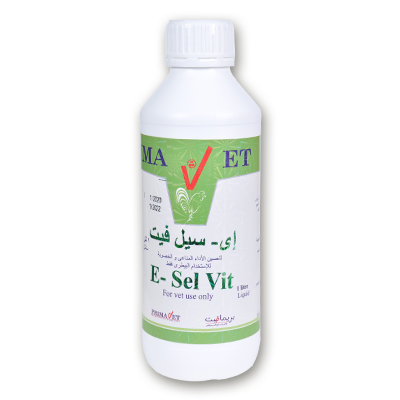 E- Sel vit
E- Sel vit
Alpha-tocopherol is insoluble in water but soluble in organic solvents Tocopherols are extremely resistant to heat but readily oxidized. Natural vitamin E is subject to destruction by oxidation, which is accelerated by heat, moisture, rancid fat, copper, and iron.
Alpha-tocopherol is an excellent naturally occurring antioxidant that protects carotene and other oxidizable materials in the feed and in the body
This anti-oxidant action links vitamin E with vitamin A metabolism (it is used for the stabilization of vitamin A in foodstuffs), and with that the unsaturated fatty acids. It prevents or slows down the formation of free radicals and hyper peroxides from poly-saturated fatty acids. The decrease in peroxide formation can be considered as a stabilizing effect on cell membranes, containing poly-saturated fatty acids.
alpha-tocopherol exerted a pronounced stimulatory influence on formation of prostaglandin E from arachidonic acid
Selenium is a trace element, reducing tissue peroxides and stimulating immunity response. Interaction with vitamin E is sometimes synergistic and sometimes partially substitutive.
Composition:
Contains 1 litre contains:
| Vitamin E (α-Tocopherol acetate) | 200 gm |
| Sodium Selenite | 450 mg |
| Propylene Glycol | 50 gm |
| polysorbate 80 | 100 gm |
| EDTA | 5 gm |
| Distilled Water | up to litre |
Target species:
Chicken and claves
Indications:
Vitamin E and/or selenium deficiency in poultry, calves, lambs, sheep, and goats
Encephalo-malacia (Crazy Chick Disease)
Improvement of chick viability
Helps to maintain and sustain the integrity of the structural tissue
Supports the development of the nervous system.
Decreased hatchability & egg production.
Enhance Vitamin A. metabolism.
Vitammin E is used to increase weight gain and to improve meat quality.
It helps in better transfer of Vitamin E & selenium to egg and semen leading to improvement of egg quality
Decrease Embryonic mortality.
Placental retention and Muscular dystrophy (White Muscle Disease, Stiff Lamb Disease),
Exudative diathesis (generalised oedematous condition),
Vitamin E plays an important role as immumo-stimulant, so it is used during and after treatment of animals and poultry from bacterial, viral and parasitic diseases.
Vitamin E acts as antioxidant, so it is added to feed containing high percentage of fats to prevent rancidity and to protect fatty tissues from oxidation.
Dose:
For oral administration via drinking water.
Poultry : 0.5 / litre of drinking water during 3- 5 days.
Calves, lambs, sheep, goats: 1 ml per 10 kg bodyweight during 3- 5 days.
Pack Size:
1 liter
